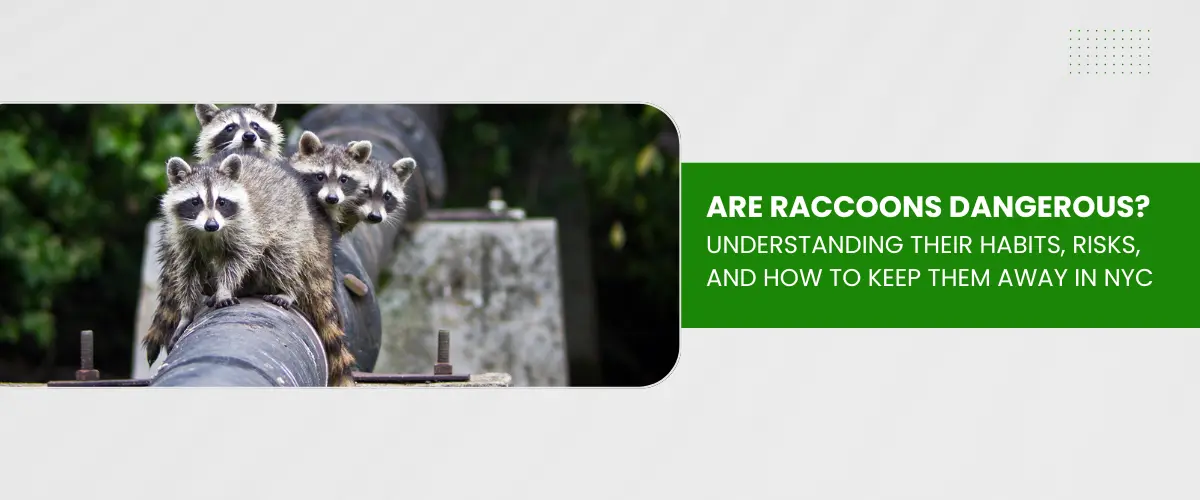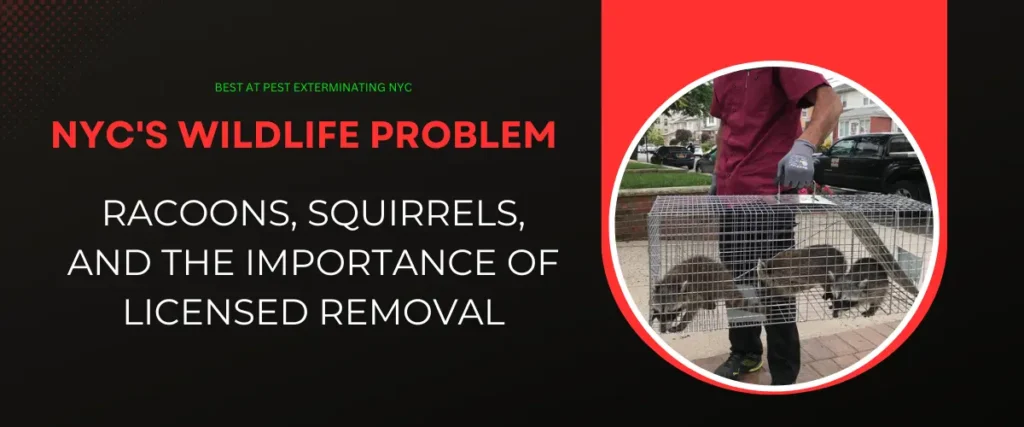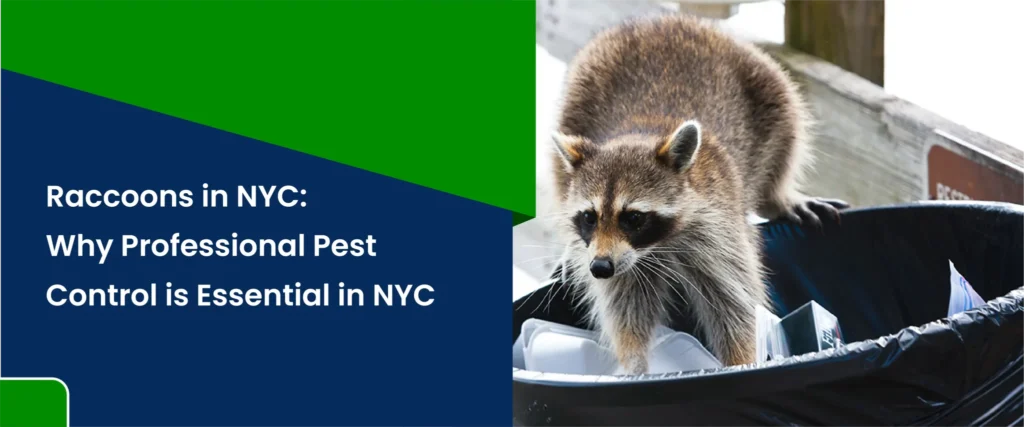
Are Raccoons Dangerous? Understanding Their Habits, Risks, and How to Keep Them Away in NYC
Raccoons, once primarily found in rural areas, have steadily made their way into urban environments. In New York City, these adaptable creatures have become a common sight, thriving in the city’s diverse habitats. Their growing presence has sparked concerns among residents about their potential impact on human health and property.
Are Raccoons Dangerous?
The question “are raccoons dangerous” has been a subject of debate. While they are generally not aggressive towards humans, they can pose risks in certain situations.
What Do Raccoons Eat?
Dietary Habits
Raccoons are omnivores, meaning they eat both plants and animals. Their diet is incredibly diverse and can vary depending on their environment and the availability of food sources. In urban areas like NYC, raccoons are particularly adept at scavenging for food, often relying on garbage, leftovers, and other human-generated waste.
Urban Scavenging
The abundance of food waste in cities provides a constant and reliable food source for raccoons. They are skilled at rummaging through garbage cans, breaking into homes, and even raiding bird feeders. This scavenging behavior can lead to property damage and nuisance problems.
Food Availability and Behavior
The availability of food in NYC directly influences the behavior of raccoons. When food is plentiful, raccoons may become more bold and aggressive in their search for food. This can increase the likelihood of encounters with humans and potential conflicts.
Do Raccoons Hibernate?
Unlike many other mammals, raccoons do not true hibernate. Instead, they enter a state known as torpor. During torpor, their body temperature drops, and their metabolism slows down significantly. However, they are not as deeply asleep as hibernating animals and can wake up periodically.
The milder winter temperatures in the city can allow some raccoons to remain active throughout the season, especially in areas with abundant food sources. However, during particularly cold spells, they may retreat to sheltered dens and enter a state of torpor.
How Long Do Raccoons Live?
Lifespan in the Wild
In the wild, raccoons typically live for around 3-5 years. However, some individuals may live longer, especially if they are able to avoid predators, diseases, and accidents.
Lifespan in Urban Environments
Raccoons living in urban environments may have a shorter lifespan due to increased competition for resources, exposure to human-related hazards, and the potential for conflicts with other animals. However, the abundance of food and shelter in cities can also contribute to a longer lifespan for some raccoons.
Factors Affecting Lifespan in NYC
Several factors can affect the lifespan of raccoons in NYC:
- Traffic accidents: Raccoons crossing busy streets are at risk of being hit by vehicles.
- Disease: Urban raccoons may be exposed to various diseases, including rabies and distemper.
- Human conflict: Conflicts with humans, such as trapping or poisoning, can shorten the lifespan of raccoons.
- Food availability: Access to a reliable food source is essential for raccoons’ survival.
When Do Raccoons Have Babies?
Breeding Season
Raccoons typically breed in late winter or early spring, usually between February and April. The exact timing can vary depending on the location and environmental conditions.
Timeline for Raising Young
After mating, female raccoons gestate for approximately 63-65 days. They usually give birth to a litter of 2-5 kits in a sheltered den. The kits are blind and helpless at birth but grow rapidly.
Raccoon mothers provide constant care for their young, nursing them and teaching them essential survival skills. The kits typically remain in the den for 6-8 weeks before venturing out on their own. By the fall, they are usually independent and capable of foraging for food on their own.
How Do Mom Raccoons Discipline Their Babies?
Raccoon Parenting
Raccoon mothers are devoted to their young and play a crucial role in their upbringing. They provide food, shelter, and protection, as well as teaching their offspring essential survival skills.
While raccoons may not exhibit the same type of discipline as humans, mothers do employ various strategies to guide their young. They may use vocalizations, body language, or even gentle physical corrections to teach their babies proper behavior. For example, a mother raccoon may swat at a curious pup to discourage it from exploring a dangerous area.
Are All Raccoons Dangerous?
While raccoons can pose risks in certain situations, it’s important to remember that not all raccoons are dangerous. The vast majority of raccoons are shy and avoid human contact. However, there are a few circumstances where encountering a raccoon could be problematic:
- Defensive behavior: Raccoons may become defensive if they feel threatened or cornered, especially when protecting their young.
- Disease: Raccoons can carry diseases, such as rabies, which can be fatal to humans.
- Property damage: Raccoons can cause damage to property by raiding garbage cans, breaking into homes, or digging in yards.
Avoiding Conflicts
To avoid conflicts with raccoons, it’s important to:
- Secure garbage: Store garbage cans and compost bins in a secure location.
- Protect bird feeders: Use bird feeders that are raccoon-proof.
- Avoid feeding raccoons: Feeding raccoons can attract them to your property and increase the risk of conflicts.
Do All Raccoons Have Rabies?
Rabies Risk in NYC Raccoons
While the risk of rabies in NYC raccoons is relatively low, it’s still important to be aware of the potential danger. Rabies is a fatal viral disease that can be transmitted through a bite from an infected animal.
Signs of a Rabid Raccoon
If you spot a raccoon that exhibits any of the following signs, it may be rabid:
- Aggressive behavior: Unusually aggressive or agitated behavior, even when not provoked.
- Disorientation: Difficulty walking or coordinating movements.
- Drooling: Excessive salivation.
- Seizures: Uncontrolled shaking or twitching.
What Diseases Do Raccoons Carry?
Raccoons can transmit several diseases to humans and pets, including:
- Rabies: A fatal viral disease that can be transmitted through a bite or scratch from an infected raccoon.
- Leptospirosis: A bacterial disease that can cause fever, headache, vomiting, and jaundice.
- Roundworms: Parasitic worms that can infect humans, especially children, through contact with raccoon feces.
Safety Measures When Encountering Raccoons
To protect yourself and your pets from diseases transmitted by raccoons, it’s important to take the following precautions:
- Avoid contact: Do not approach or handle raccoons.
- Vaccinate pets: Ensure that your pets are vaccinated against rabies and other diseases.
- Wear gloves: Wear gloves when handling or cleaning up after raccoons.
- Wash hands: Wash your hands thoroughly with soap and water after coming into contact with raccoons or their feces.
How to Get Rid of Raccoons
If you have a raccoon problem on your property, it’s important to handle the situation safely and effectively. Here are some techniques you can try:
- Habitat modification: Make your property less attractive to raccoons by securing garbage, removing food sources, and blocking access to potential dens.
- Repellents: Use commercial repellents or homemade remedies to deter raccoons.
- Trapping: If necessary, you can trap raccoons and relocate them to a suitable habitat. However, it’s important to follow New York regulations and obtain any necessary permits.
Professional Help to get Raccoon control
If you’re unable to resolve the raccoon problem on your own, it’s best to contact a professional wildlife removal company i.e bestatpest exterminating in New York. They have the experience and equipment to safely and effectively remove raccoons from your property.
How to Keep Raccoons Away
Preventative Measures
To keep raccoons away from your home and property, consider the following strategies:
- Secure garbage: Store garbage cans and compost bins in a secure location, such as a garage or shed.
- Remove food sources: Avoid leaving food or pet food outside.
- Bird feeder protection: Use bird feeders that are raccoon-proof.
- Block access to dens: Seal up any potential entry points to your home or attic.
- Repellents: Use commercial repellents or homemade remedies to deter raccoons.
Effective Methods for NYC Residents
In NYC, it’s especially important to take precautions to prevent raccoon problems. Due to the high density of urban areas, raccoons may be more likely to seek food and shelter in residential neighborhoods.
Specific tips for NYC residents include:
- Secure outdoor grills: Cover outdoor grills when not in use to prevent raccoons from accessing food scraps.
- Be cautious with pet food: Feed your pets indoors or use pet feeders that are raccoon-proof.
- Report nuisance raccoons: If you have a persistent raccoon problem, contact Bestatpest Exterminating.
How to Keep Raccoons Out of Trash and Yard
Securing Trash Bins
- Use heavy-duty bins: Invest in sturdy, raccoon-resistant trash bins.
- Secure lids: Use bungee cords or chains to secure the lids of your trash bins.
- Store indoors: If possible, store trash bins indoors overnight.
Protecting Your Yard
- Remove food sources: Clean up food scraps and birdseed that may attract raccoons.
- Cover compost bins: Securely cover your compost bin to prevent raccoons from accessing food scraps.
- Use motion-activated lights: Install motion-activated lights in your yard to deter raccoons.
- Consider fencing: If you have a particularly persistent raccoon problem, you may need to install fencing around your property.
How to Keep Raccoons Out of the Garden
Raccoons can be a nuisance to gardeners, as they are known to dig up plants, eat fruits and vegetables, and damage lawns. Here are some effective ways to keep raccoons out of your garden:
Physical Barriers:
- Fencing: Surround your garden with a tall, sturdy fence that raccoons cannot climb over or dig under.
- Chicken wire: Place chicken wire around the base of plants to deter digging.
- Motion-activated sprinklers: Install motion-activated sprinklers to scare raccoons away.
Other Strategies:
- Plant less attractive plants: Consider growing plants that are less appealing to raccoons, such as herbs, flowers, or ornamental grasses.
- Harvest regularly: Harvest fruits and vegetables promptly to prevent raccoons from accessing them.
- Provide alternative food sources: If raccoons are attracted to your garden for food, try providing them with alternative food sources, such as bird feeders or a raccoon-proof garbage can.
Conclusion
While raccoons can be fascinating creatures, they can also pose risks to human health and property. By understanding their habits, behaviors, and potential dangers, you can take steps to prevent problems and coexist peacefully with these adaptable animals.
Final Advice for NYC Residents
- Be vigilant: Keep a watchful eye on your property for signs of raccoon activity.
- Secure your home: Take measures to prevent raccoons from entering your home or attic.
- Protect food sources: Store garbage, pet food, and birdseed securely.
- Avoid feeding raccoons: Feeding raccoons can attract them to your property and increase the risk of conflicts.
Are you tired of dealing with pesky raccoons? Bestatpest Exterminator offers safe and effective solutions to remove raccoons from your property. Our experienced team can provide expert advice, humane removal techniques, and preventative measures to keep raccoons away for good.
Make a call on 718-284-7378, 718-284-7379 or visit website: https://bestatpestnyc.com/ today for consultation and raccoon removal services.



